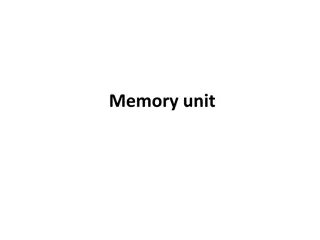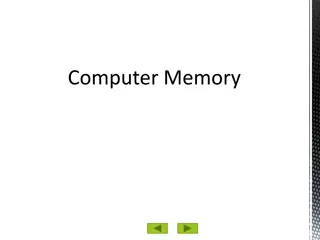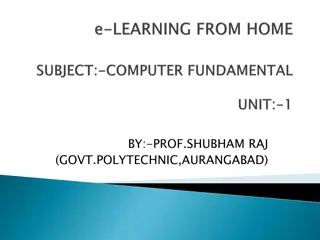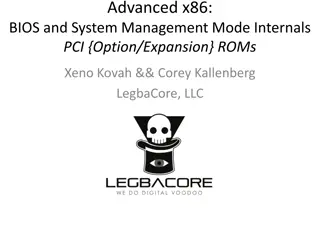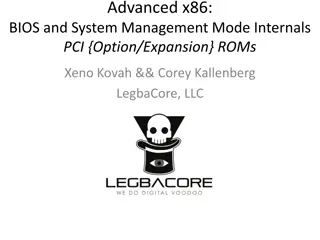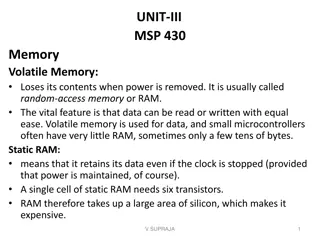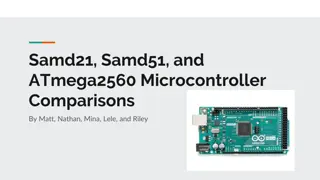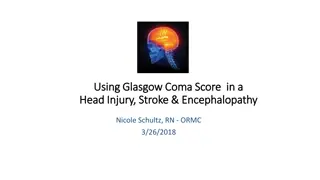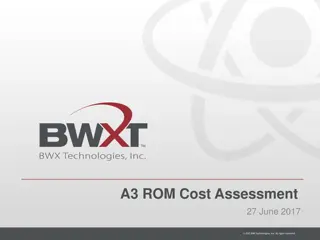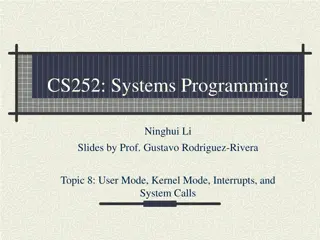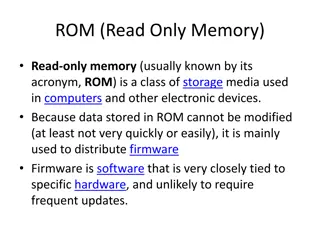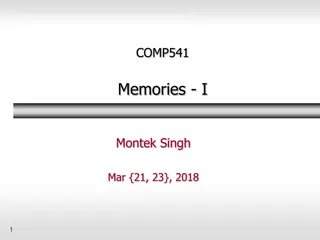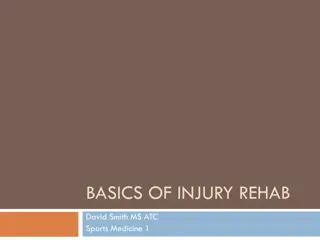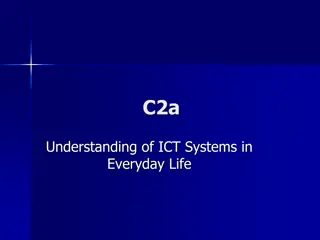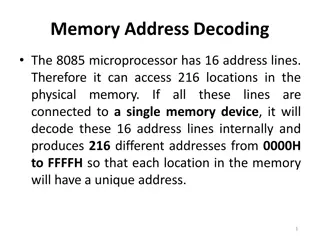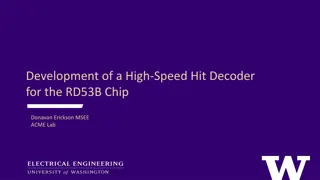Understanding the Rule of Mixtures in Composite Materials
The Rule of Mixtures (ROM) is a weighted method for predicting the properties of composite materials, such as fiber-reinforced polymers (FRP). This method relies on assumptions regarding the homogeneity and properties of fibers and matrices. By combining volume fraction and properties linearly, the
5 views • 23 slides
Understanding Memory Units in Computing
Memory units are essential components in computing devices that store binary information in words, allowing for fast and efficient data retrieval. They consist of storage cells, circuits, and address selection lines for communication. Random Access Memory (RAM) enables quick access to data, while Re
6 views • 15 slides
Understanding Computer Memory Fundamentals
Memory in computers is essential for storing and processing data. It is composed of semiconductor switches that represent binary numbers as 0s and 1s. This article covers the basics of memory, including bits, ROM, and RAM, explaining their functions and significance in a computer system. It also dis
12 views • 44 slides
Understanding Memory Organization in Computers
The memory unit is crucial in any digital computer for storing programs and data. It comprises main memory, auxiliary memory, and cache memory, each serving different roles in data storage and retrieval. Main memory directly communicates with the CPU, while cache memory enhances processing speed by
1 views • 37 slides
Understanding the Basics of Computer and Its Components
A computer is an electronic device that processes data input by the user to provide output results. It comprises components like ALU, CU, and MU, each with specific functions. The CPU acts as the brain of the computer, transforming raw data into information. The system's memory units, RAM and ROM, s
2 views • 12 slides
Understanding PCI Expansion ROMs in x86 Systems
This content delves into the intricacies of PCI Expansion ROMs (XROMs) in x86 systems. It covers the basics of XROMs, their execution during the boot process, configuration through Expansion ROM Base Address Register, and handling in PCI and PCIe devices. The role of BIOS in initializing XROMs and t
3 views • 21 slides
Understanding PCI/PCIe Expansion ROMs in x86 Systems
Explore the internals of PCI/PCIe Expansion ROMs (XROMs) in x86 systems, examining their role as executable code located on PCI devices, handling by BIOS during boot, configuration via Expansion ROM Base Address Register, and differences on legacy versus modern systems.
4 views • 21 slides
Wedding Day Photography Experts
At Rainstar Photography, our experienced photographers expertly capture every moment of your ROM wedding actual day Photography. We focus on the laughter, tears, and joy, ensuring your wedding photos reflect the essence of your special day. Contact u
1 views • 5 slides
Understanding the Basics of BIOS in Computers
BIOS (Basic Input Output System) is a crucial piece of software that serves as an intermediary between a computer's hardware and the operating system. It plays a fundamental role in facilitating communication and interaction between the hardware components and software applications. This article del
1 views • 26 slides
Understanding Different Types of Memory in MSP430 Microcontrollers
MSP430 memory includes volatile RAM, dynamic RAM, nonvolatile ROM, EPROM, and flash memory. Each type has unique characteristics such as data retention, ease of read/write, cost implications, and methods of programming and erasing. Microcontrollers utilize various memory types based on requirements
0 views • 73 slides
Exploring Contiki and Contiki-NG: A Comprehensive Overview
Contiki and Contiki-NG are wireless sensor network platforms offering software and hardware solutions. Contiki uses the Protothread-based operating system, while Contiki-NG utilizes a component-driven C programming model. The development process involves static modules in ROM, with user programs loa
0 views • 23 slides
Understanding Microcontrollers: A Comprehensive Overview
Microcontrollers, like the Samd21, Samd51, and ATmega2560, are essential components in electronic systems, featuring processors, memory units, and peripherals. Learn about their history, applications in automobiles and medical devices, as well as how they work and their structure. Explore the role o
5 views • 14 slides
Understanding Glasgow Coma Score in Head Injury, Stroke & Encephalopathy
A 61-year-old female with intractable headache and eye pain was admitted for sepsis secondary to herpes zoster, leading to encephalopathy and CO2 Narcosis. Through accurate Glasgow Coma Score (GCS) documentation, the Severity of Illness (SOI) and Risk of Mortality (ROM) were improved. Coding guideli
0 views • 7 slides
Davor Rom: 7 Ways to Enhance Your Real Estate Investment
Davor Rom is a distinguished Commercial Real Estate Investor and Fund Manager, renowned for his strategic acumen and robust portfolio in the real estate sector. With a keen eye for identifying lucrative investment opportunities and a deep understandi
1 views • 10 slides
Understanding Optical Storage Technology
Optical storage technology originally designed for audio offers a capacity of 650MB, providing over 70 minutes of audio playback. Data is recorded digitally on a polycarbonate disk's surface as microscopic pits. The disk is organized in a spiral track with sectors of the same length arranged in bloc
5 views • 16 slides
Understanding Range of Motion (ROM) in Joint Movement
Range of Motion (ROM) refers to the extent a joint can move without causing pain, with measurements done passively or actively. Various factors can lead to a lack in ROM, such as trauma, illness, or muscle weakness. Pain plays a crucial role in limiting movement, hence assessing non-verbal signs of
0 views • 18 slides
Conclusions and Recommendations on Result-Oriented Monitoring in EU4Environment Contracts
The Result-Oriented Monitoring (ROM) exercise in the EU4Environment contracts revealed issues such as project delays, lack of indicators for accountability, and insufficient gender analysis. Despite these challenges, there is optimism for the implementation of work plans in the five countries involv
0 views • 6 slides
Comprehensive Guide to Reporting in Personal Care Assistance Assessment
The report outlines the importance of accurate reporting in Personal Care Assistance (PCA) assessments, emphasizing compliance with regulations and the need for current information. It provides guidance on submitting PCA reports, ensuring accuracy in claimant details, and avoiding misleading informa
0 views • 16 slides
A3 ROM Cost Assessment & Full Scale Test Estimate
This document outlines the process and tasks involved in assessing the cost estimate for A3 ground test equipment, including evaluating equipment needs, estimating engineering costs, developing equipment lists, and identifying safety-related systems. It also details the breakdown of systems and subs
0 views • 27 slides
ROM Wedding Day Photography in Singapore
At Rainstar Photography, we specialize in ROM Wedding Actual Day photography, capturing every special moment with care and precision. From the intimate laughter and joyful tears to the heartfelt emotions, our experienced photographers ensure that eve
1 views • 5 slides
Understanding User Mode, Kernel Mode, Interrupts, and System Calls in Computer Architecture
In modern computers following Von Newman Architecture, programs and data are stored in RAM. The CPU, RAM, ROM, and devices communicate via address and data buses. The system operates in both kernel and user modes, where kernel mode allows full system control, while user mode restricts access for sec
0 views • 29 slides
Survey on Routine Outcome Measurement in UK CAMHS Services
This study by Holly Bear, a PhD student at UCL & EBPU, explores the current practices and perspectives towards routine outcome measurement (ROM) in UK Child and Adolescent Mental Health Services (CAMHS). The research delves into the barriers and facilitators to utilizing outcome measurement in pract
0 views • 18 slides
Understanding ROM: Read-Only Memory in Computers
ROM (Read-Only Memory) is a class of storage media used in computers and electronic devices to distribute firmware. While classic mask-programmed ROM is unchangeable, modern types like EPROM and EEPROM can be erased and re-written. Different types of ROM, such as PROM and OTP, offer varying degrees
0 views • 19 slides
Understanding Solid-State Memory and Physics
Exploring the science behind flash memory, types of memory, and solid-state ROM technology. Delve into the principles of non-volatile memory, solid-state physics, and the atomic shell model as elucidated by quantum mechanics. Discover the complexities and applications of memory devices in the realm
0 views • 59 slides
Understanding Different Types of Memory Technologies in Computer Systems
Explore the realm of memory technologies with an overview of ROM, RAM, non-volatile memories, and programmable memory options. Delve into the intricacies of read-only memory, volatile vs. non-volatile memory, and the various types of memory dimensions. Gain insights into the workings of ROM, includi
0 views • 45 slides
Davor Rom: How Can Caprock Fund’s Solve Your Investment Worries?
Davor Rom, a leader at Caprock Fund, is committed to helping investors overcome the challenges of today\u2019s volatile markets. By leveraging his market analysis and risk management expertise, he ensures that Caprock Fund provides personalized inves
2 views • 9 slides
Basics of Injury Rehabilitation: Key Concepts and Strategies
Understanding injury rehab is crucial for athletes. Injuries happen, but most are non-life-threatening. The goal of rehab is to safely return athletes to activity through steps like controlling swelling, managing pain, restoring range of motion, and building strength. Additional goals include daily,
0 views • 17 slides
Understanding ICT Systems in Everyday Life
Explore the basic components of a computer system, including the processor, internal memory, input/output devices, and storage, with a focus on how computer systems function in daily life. Learn about computer monitors, the role of operating systems, RAM and ROM memory types, cache memory, and how c
0 views • 130 slides
Memory Address Decoding in 8085 Microprocessor
The 8085 microprocessor with 16 address lines can access 216 locations in physical memory. Utilizing a 74LS138 address decoder, chip select signals are generated for memory block selection. The interfacing involves decoding address lines to enable memory access, with distinctions between RAM and ROM
0 views • 18 slides
High-Speed Hit Decoder Development for RD53B Chip
Development of a high-speed hit decoder for the RD53B chip by Donavan Erickson from MSEE ACME Lab, focusing on data streams, hitmap encoding, ROM splitting, decode engine building, and more. The process involves encoding methods, ROM setup with borrowed software look-up tables, and buffer systems fo
0 views • 33 slides
Capturing Your ROM Wedding Day Moments
At Rainstar Photography, our skilled team is dedicated to capturing every heartfelt moment on your ROM Wedding Actual Day photography. From joyous laughter to quiet, touching expressions, our photographers focus on the essence of your celebration, en
1 views • 5 slides

